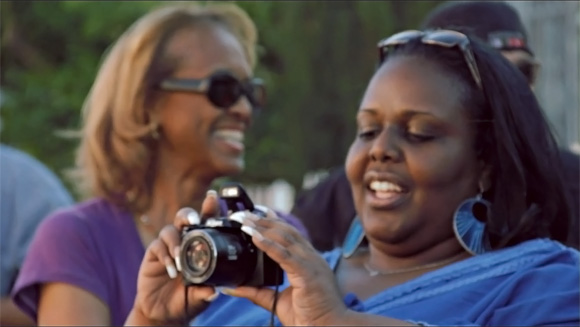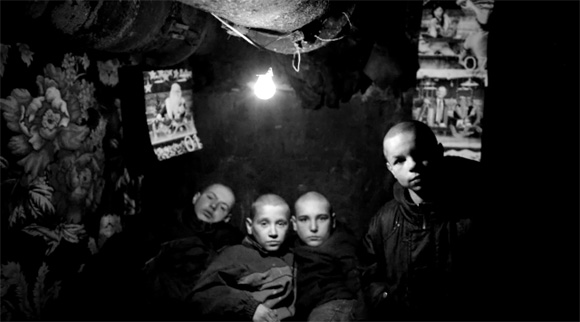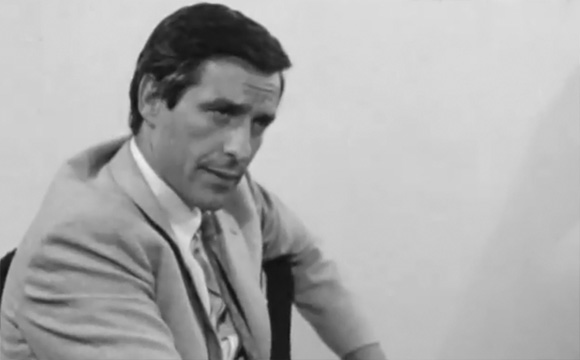Artist Michael Heizer’s enormous new work on the grounds of the Los Angeles County Museum of Art required a 340-ton boulder as its centerpiece. The boulder had to be transported over 100 miles from its quarry. At first, I was very interested in this rock. It’s huge! But soon I became more interested in the city’s reaction to the rock. So this film documents the final few miles of the rock’s journey, but it also documents the people who came out to be a part of the great Los Angeles rock transport. The film is part documentary and part personal impression. The simple fact of the matter is that the rock’s arrival is an unusual milestone in the life of this city. You can tell that simply by looking at the faces in my film.
Category Archives: Documentary Film
The Neglected: A Film About the Street Children of Ukraine by David Gillanders
Photographer David Gillanders of Scotland made this film from his work photographing the homeless children of Ukraine. It was produced by Britain’s Channel 4. The drug addiction and desperate living conditions make for a very upsetting experience. It is difficult to imagine how children can be allowed to slip below the streets to live in sewers. It is an unforgivable sin in any civilization to allow this to happen to its children. Most of these kids are now dead.
It seems to me a worthy form of journalism that straightforwardly documents suffering that is being experienced by the most helpless members of a population.
Thank you to Paul Gallagher at Dangerous Minds.
Filmmakers of Our Time: John Cassavetes – 1968 French Documentary
John Cassavetes’ first film was called ‘Shadows.’ It was made in 1959 and I think it might be the greatest film about race in America that’s ever been made. Cassavetes has always struck me as having an element of that required con-man aspect of the personality that is present in many good actors. When he talks he seems impressed with what he is saying and he knows how to deliver it with just the right amount of humor and a few self-deprecating remarks. But he means every goddamn word of it and he puts all of his thoughts into his film works. He’s one of those rare objects of confusion that sometimes crop up in American art. I’ve been watching a bunch of his films lately and I don’t think I’ve ever seen a filmmaker so interested in looking at the inability of the American adult to understand or even perceive the meaning of their habitual mannerisms. For me, his films illuminate what it means to be a grownup and how the performance required of grownups contrasts with what they really want to be.
Cassavetes on making ‘Shadows:’
That people can go out with nothing and through their own will and through their determination make something that exists… out of nothing. Out of no technical know-how, no equipment. There wasn’t one technician on the entire film. There wasn’t anybody who knew how to run a camera… walked in and started to read the directions of how to reload it. Got a Movieola and looked at it. Did all the things in the world and we made eight million mistakes. But it was exciting and fun.
This is a 1968 French documentary that was probably shot just after or during the making of his great marriage disaster film, ‘Faces.’
1958 Mike Wallace Interview with Brave New World Author Aldous Huxley
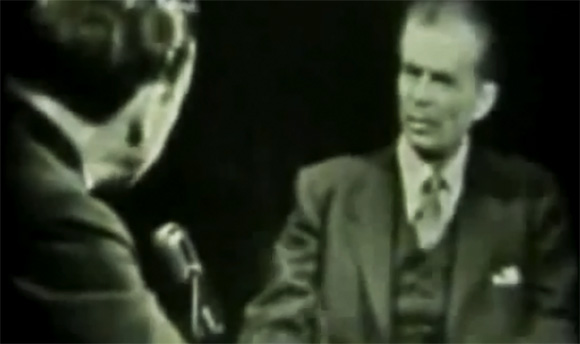
Mike Wallace talks to ‘Brave New World‘ author Aldous Huxley, focusing on the danger of slipping into totalitarian government as a result of overpopulation, increasing hierarchical organization of people in corporate structures, and improper use of television and subliminal advertising. He continually refers to the similarity between the methods of advertising agencies and those of political dictators.
Wallace: …and we’ll be persuaded to vote for someone that we do not know we are being persuaded to vote for?
Huxley: Exactly, I mean this is the rather alarming feature… that you are being persuaded below the level of choice and reason.
Perhaps that explains the election of George W. Bush, a raging drunk without the slightest education – a psychopathic false cowboy with delusions of a holy mission to invade the Middle East. It was national suicide. The election of Bush was the worst thing to happen to the United States since the Civil War and it cannot be explained by logic. The world is only at the beginning of decades spent recovering from the criminality and death unleashed by Bush. I think Huxley might have said that Bush was the easily predictable outcome of uncontrolled corporatization. Every corporation likes to push dull-witted and unimportant people into middle management positions where they can function as the tiered facade standing between the board members and the Chinese slave camps.
Jean Cocteau – Lies and Truths: 1996 French Documentary
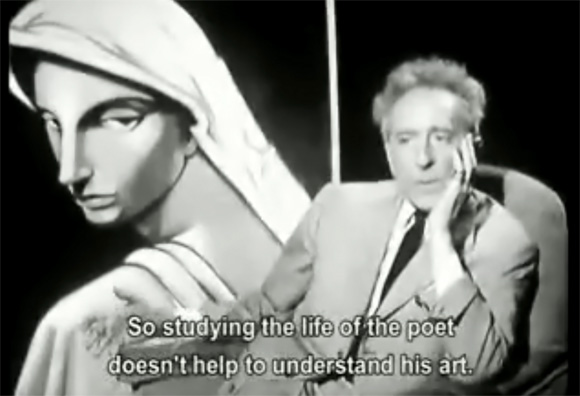
This is a 1996 documentary by Noël Simsolo, featuring many interviews with Jean Cocteau himself, Jean-Luc Godard and actor Jean Marais. The great French director of films like ‘Blood of a Poet,’ ‘Orpheus,’ and ‘Beauty and the Beast,’ was also an essayist, poet, artist, and playwright. When I was a kid I read the book he wrote about filming ‘Beauty and the Beast.’ I understood little of it except that there was the general impression of someone working against constant hardship to attain a mysterious something. The book detailed his struggles with the subtleties of light, weather and performance in the pursuit of a mysterious quality that must be present in the fairytale. I knew that his efforts had worked because I had seen the film on television and understood that it was simply the most convincing fairytale I had ever seen. Another film with this totally mysterious quality is ‘Orpheus,’ which is Cocteau’s modern version of the Greek myth in which the great musician/poet descends into the underworld to bring his wife back to the world of the living. Cocteau’s telling of the tale is at once ancient and modern, always mysterious and always trying to get close to poetry. Whenever I see that film I feel that I am seeing an important picture of French artistic life in the late 1940s told through the prism of ancient Greek myth. The film sits in that fascinating period of artistic ferment and dawning of a new cinematic movement that was a reaction to the end of World War II. Possibilities in films of that period seem limitless. There is a calmness of the image, an almost casual approach to creating scenes. Things are becoming more fluid and less studio-bound. Films are beginning to lean toward poetry and art.
Even though I never really understood what was being said in the ‘Orpheus’ film, it is probably one of the most important influences on the little bits of work that I do in film and video. Various images and scenes from ‘Orpheus’ regularly pop into my head as I work.
One of the best things I think an artist can learn from looking at Jean Cocteau is to follow one’s own interests without worrying about being unqualified – pretending can eventually get you where you want to go if you do it absolutely.
1964 Documentary on Spanish Surrealist Film Director Luis Buñuel
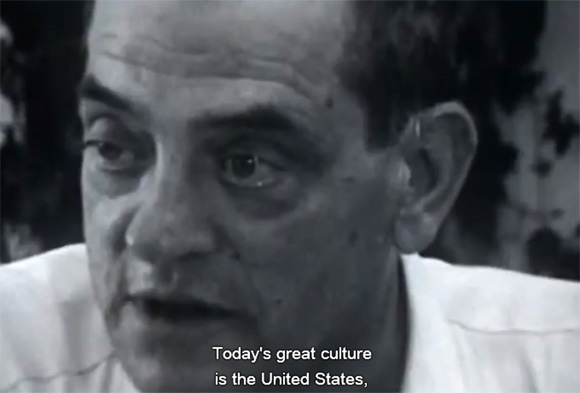
Luis Buñuel was the great Spanish film director who made ‘Un Chien Andalou’ and ‘L’Age d’Or,’ two of the original surrealist films. This documentary, directed by Robert Valey, was made in 1964. The director talks freely and with a certain charming guile about his influences, friends, paranoias, enjoyments and his impressions of various countries. He once smacked Salvadore Dali down on 5th Avenue in New York city!
I enjoy listening to people like him talk about their work because they talk about how they see things – how they interpret the world. Compare the way he talks in this film to what you normally see coming from people like Steven Spielberg or Martin Scorsese. Those people don’t seem real. They don’t seem to have any point of view. Notice how people in the film consistently associate Buñuel’s filmmaking with the work of painters. It is the continual grinding down of art into business that destroys real culture. One should immerse one’s self in better ideas and more subtle things if one wants to avoid the dullness that permeates most film work currently going on in the United States. I have found it to be a general rule that people with real talent who are artists answer questions in a slightly confusing manner. Clarity is another word for fake. Buñuel appears to me to fit this general principal.
Buñuel wrote a short and very beautiful autobiography called ‘My Last Sigh.’ I recommend it very highly if you want to know more about the mind behind Surrealist film.
And of course, here is the great Surrealist short film, ‘Un Chien Andalou,’ made by Buñuel in 1929.
